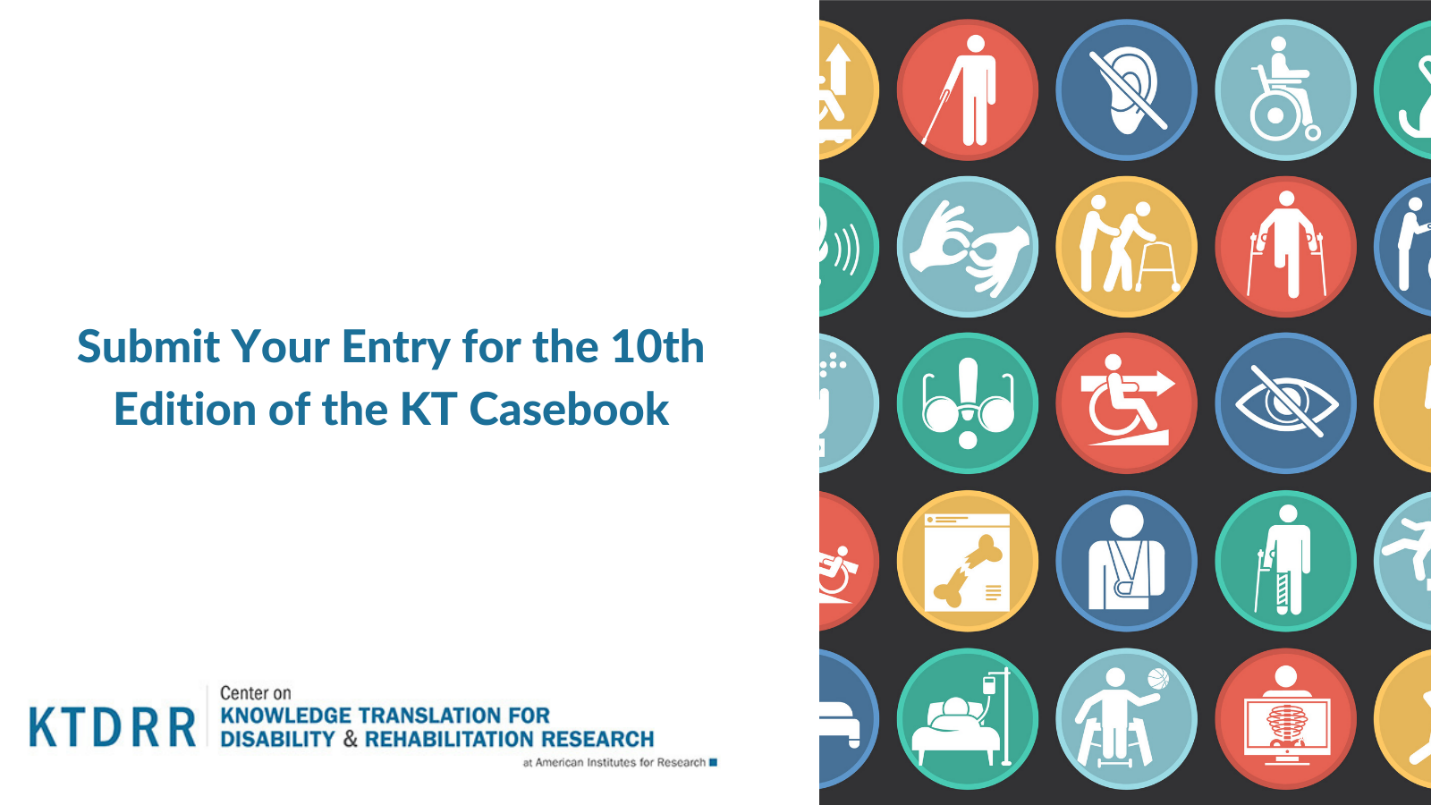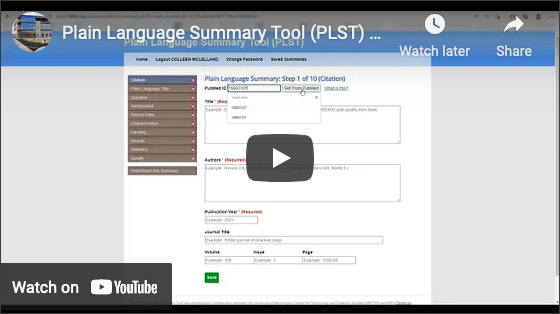KTDRR KT TA Network Call, June 28th, 3-4 p.m. ET
Join the Center on KTDRR to continue the conversation from previous KT TA Network meetings as related to our KT activities.
Date and time: Tuesday, June 28th, 2022 (3:00 - 4:00 pm Eastern)
Location: Zoom
We will have CART and an ASL interpreter at the event.
This event is for NIDILRR grantees and their staff only.
The joining link will be sent to registrants.
Registration is available at: https://survey.alchemer.com/s3/6871875/
Registration-June-2022-KT-TA-Network-Call
REGISTER NOW
NIDILRR Grantees: Sign up for an interview
and KTDRR staff will draft your
KT Casebook entry for you!
The 10th edition of the KT Casebook is in progress—and your NIDILRR-funded project could be in it!
The KT Casebook showcases how NIDILRR grantees are using innovative, effective, and measured knowledge translation (KT) strategies to ensure their research is useful to their audiences.
If you are part of a NIDILRR project, please contact us about
submitting an entry. Our staff will help to draft your entry, starting with information
gathered from your project abstract housed on the website of the National Rehabilitation Information Center,
NARIC.com. Then, we will set up an interview with you to go over our draft and work with you to elaborate on its details, especially as they relate to the KT activity we’re highlighting.
Check out previous editions of the KT Casebook for examples of featured KT activities. Our most recent edition highlights grantees from NIDILRR's technology portfolio:
Please let us know if your NIDILRR project should be featured!

Innovative Strategies
for Systematic Review Methods
Given that it may take a year or longer to complete a systematic review (SR) and that the data synthesized are even older, the need for updating is a critical part of the SR process. KTDRR offers two products addressing current strategies for updating SRs: a new Info Brief, and an expanded archive of a January webcast on this topic.
Information in these resources, particularly as related to use of machine learning in searches, could also apply to new reviews.
Info Brief: New Methods and Technologies for Keeping Systematic Reviews Up to Date. This Info Brief outlines innovations in bibliographic data searching that may be helpful in identifying studies for systematic reviews. James Thomas, deputy director of the Evidence for Policy and Practice Information and Co-ordinating Centre (EPPI-Centre) at University College London, begins with an overview of methods currently used to search existing bibliographic databases. Next, he examines changes in the collection of bibliographic databases and recent advances in methods for retrieval of information, including a study using Microsoft Academic Graph (MAG) and OpenAlex as single-source databases. Finally, he illustrates the potential these new developments hold for the systematic review process with a case study of the EPPI-Centre’s living systematic map of COVID-19 research.
Webcast Archive: Current Strategies for Updating Systematic Reviews. In this archived webcast, representatives of international organizations that are well-known and respected for conducting SRs discuss their approaches and current strategies for updating SRs.
- Dr. Carlton Fong, editor of the Campbell Collaboration’s
Disability Coordinating Group, discusses the process implemented in an updated SR published in 2021.
- Professor James Thomas, deputy director of the
EPPI-Centre, describes innovative tools and processes, including the living systematic map of evidence on COVID-19.
- Dr. Chiara Arienti, coordinator and methodologist, presents the perspective from
Cochrane Rehabilitation by sharing the process used with the
REH-COVER project, a rapid living SR on rehabilitation intervention for the management of COVID-19.
View the YouTube Video (including timestamps) and download accessible
PDF files of the presentation materials, as well as
transcripts of the audio. After viewing the presentation,
please provide your feedback on our brief Evaluation Survey.
*Updated* Plain Language Summary Tool
The Center on KTDRR recently updated the instructional video and manual for the Plain Language Summary Tool (PLST).

Written in everyday language, plain language summaries help a non-research audience understand findings more clearly. Based on standards developed by the Cochrane Collaboration, the PLST is a web-based resource that supports authors as they begin to write a plain language summary of a systematic review.
The new PLST interface allows users to see their progress as they enter information within the tool, edit or delete information more quickly and easily share the summary link with others.
The PLST is open to all users including researchers, research assistants, and anyone else who needs to write a plain language summary.
| 


